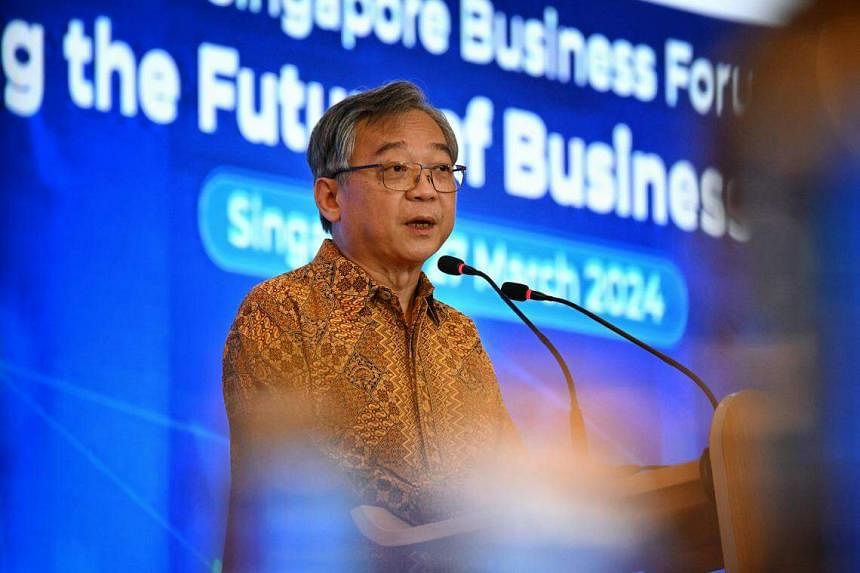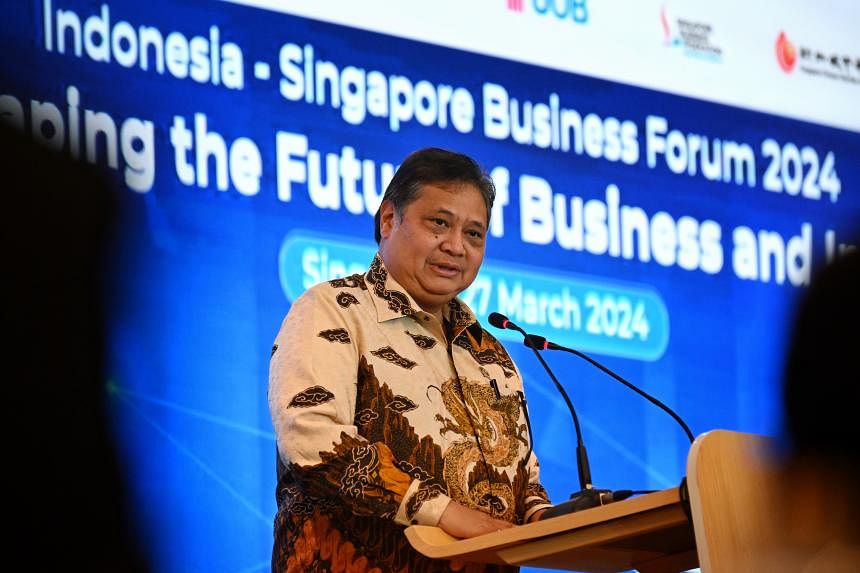SINGAPORE - Singapore companies have opportunities to participate in Indonesia’s growth by investing in developing sectors such as the digital economy and energy, said Indonesia’s Coordinating Minister for Economic Affairs Airlangga Hartarto.
He said in a media interview that Indonesia is expanding the digital sector with data centres and artificial intelligence, the electronics sector including semiconductors, and the energy sector.
Indonesia is also looking to ensure a just transition from fossil fuels to more sustainable sources of energy, with projects in the pipeline that centre around geothermals, renewable energy, carbon capture and storage, urban waste treatment and power.
He added that Indonesia’s macroeconomic direction and prudence will remain the same under President-elect Prabowo Subianto’s incoming government.
It also wants to focus on upgrading its human resources, including reskilling people so they are ready for the future of work.
Mr Airlangga was speaking on the sidelines of the Indonesia-Singapore Business Forum at Hilton Singapore Orchard on March 27.
The event was organised by Enterprise Singapore, the Embassy of the Republic of Indonesia in Singapore and the Indonesia Investment Promotion Centre Singapore.
The Straits Times and CNA were its media partners.
In his speech at the forum, Mr Airlangga noted that the Indonesian government is formulating policies that support economic growth.
One such initiative is the launch of special economic zones, such as one for data centres in Nongsa and one for health in Bali.
Singapore and Indonesia have been working closely to facilitate partnerships in the areas of healthcare services, digital health and biotech, said Minister for Trade and Industry Gan Kim Yong, who also delivered an opening address at the forum.
Other areas of opportunity include the digital and green economies, which are “twin engines” of growth in the region, he said.
“South-east Asia’s digital economy is projected to reach US$1 trillion (S$1.35 trillion) by 2030. In order to unlock the region’s potential in this space, two critical ingredients must be present.
“First, free and secure data flows, and second, a strong pipeline of tech manpower,” he added.
This will pave the way for greater connectivity within the region, and also ensure that the region has enough human resources to meet the demands of tech and digitalisation, Mr Gan said.
He commended Indonesia’s leadership as Asean chair in 2023, under which the bloc endorsed a study on the Asean Digital Economy Framework Agreement to provide a vision of harmonious digital opportunity for the region.
“To complement efforts on this front, our officials have also been championing for clearer regulations on cross-border data flows between Singapore and Indonesia,” he said.
Both countries have also worked closely to further develop young, skilled professionals in the tech sector, Mr Gan added.
In March 2023, Mr Airlangga and Mr Gan signed an agreement to create a programme to allow fresh graduates from Singapore and Indonesia to pursue short-term, tech-related job opportunities in each other’s countries.
Meanwhile, with the green economy, Singapore and Indonesia have also made concerted efforts to deepen collaboration in climate change and energy, Mr Gan said.
For example, Singapore’s Energy Market Authority granted conditional approval in September 2023 for the import of two gigawatts of low-carbon electricity from Indonesia to Singapore.
This will involve installing the largest solar and battery manufacturing plants in Indonesia to serve the energy needs of both countries, and attract green investments to Indonesia, Mr Gan said.

“At the business-to-business level, we have also seen strong partnerships between Singapore and Indonesia companies in the green economy,” he added, noting that Singapore energy player Sembcorp Industries and Indonesia’s main electricity distributor PLN are collaborating on utility-scale solar projects, including in Nusantara, the future capital city of Indonesia.
“Singapore and Indonesia share excellent bilateral relations underpinned by strong and broad-ranging economic cooperation,” he said.
Bilateral trade amounted to $69 billion in 2023, making Indonesia one of Singapore’s largest trading partners in Asean, as well as Singapore’s sixth-largest trading partner. Singapore has also consistently been Indonesia’s top source of foreign direct investment since 2014, recording US$15.4 billion (S$20.8 billion) in 2023, he said.
Indonesia’s Ambassador to Singapore Suryo Pratomo also said in his opening remarks that Indonesia has strong economic potential despite the changing political landscape and that it will continue to strive to ensure long-term growth.
He added that the theme of the forum – Beyond the ballot: Shaping the future of business and investment in Indonesia – was chosen to present an opportunity for both countries to explore and identify areas of business and investment where both can work together.
At a panel discussion moderated by ST editor Jaime Ho, former Indonesian Minister of Trade Muhammad Lutfi reiterated the importance of ensuring that trade in Asean remains free, open and inclusive.
“This is not a hidden secret for us, but an oath of Indonesian foreign policy,” he said in response to a discussion question on geopolitics, specifically the possibility of Donald Trump being re-elected as United States president.


